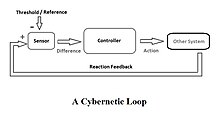Our website is made possible by displaying online advertisements to our visitors.
Please consider supporting us by disabling your ad blocker.
Cybernetics

| Complex systems |
|---|
| Topics |
| Part of a series on |
| Cyborgs |
|---|
 |
| Cyborgology |
| Theory |
| Centers |
| Politics |
| Related articles |
Cybernetics is the transdisciplinary study of circular processes such as feedback systems where outputs are also inputs. It is concerned with general principles that are relevant across multiple contexts,[1] including in ecological, technological, economic, biological, cognitive and social systems and also in practical activities such as designing,[2] learning, and managing.
The field is named after an example of circular causal feedback—that of steering a ship (the ancient Greek κυβερνήτης (kybernḗtēs) means "helmsperson"). In steering a ship, the helmsperson adjusts their steering in continual response to the effect it is observed as having, forming a feedback loop through which a steady course can be maintained in a changing environment, responding to disturbances from cross winds and tide.[3][4]
Cybernetics' transdisciplinary[5] character has meant that it intersects with a number of other fields, leading to it having both wide influence and diverse interpretations.
- ^ Ashby, W. R. (1956). An introduction to cybernetics. London: Chapman & Hall.
- ^ "Design Cybernetics". Design Research Foundations. Cham: Springer International Publishing. 2019. doi:10.1007/978-3-030-18557-2. ISBN 978-3-030-18556-5. ISSN 2366-4622. S2CID 239279379.
- ^ Gage, Stephen (2007-01-01). "The boat/helmsman". Technoetic Arts. 5 (1). Intellect: 15–24. doi:10.1386/tear.5.1.15_1. ISSN 1477-965X.
- ^ "What is cybernetics - NTNU". www.ntnu.edu. Retrieved 2023-04-27.
- ^ Müller, Albert (2000). "A Brief History of the BCL". Österreichische Zeitschrift für Geschichtswissenschaften. 11 (1): 9–30. Archived from the original on 2012-07-22. Retrieved 2012-06-06.
Previous Page Next Page


